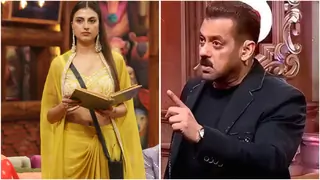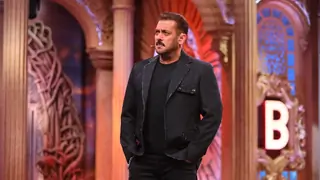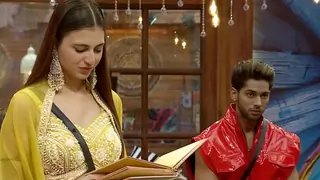Folks,
I was bemused, as I scanned thru the forum just now, to see nothing except lamentations and complaints that there was no jungle romance. No wonder the CVs, subjected to these barrages, periodically slip into a Mills and Boon track, regardless of what it is that sets Jodha Akbar, even though it is an Ekta production, apart from the mushy soaps that foam all around us on TV these days!
So, despite the fact that there was nothing much today to analyse, I thought of sharing my very different take on this episode with those who might be interested
First, even in such few posts as do not fit into the above-mentioned deep mourning category, , the focus is on giving Jodha credit for her honesty in confessing that it was all the wages of her folly.
I think the precap is a nightmare of hers, for a different reason, but let that pass for the moment. What else could or would Jodha have done? She cannot tell a direct lie to her Ammijaan. Racked as she is by remorse and shame, it is in fact a kind of catharsis for her to confess and invite punishment. She simply has no other way out. It is not honesty, it is an attempt to lessen the guilt that weighs her down like a rock.
If she had had a greater understanding of the repercussions of such self-indulgent candour, she would at least have tried to fudge matters even if she could not lie. But she has no such understanding, and so she blurts out everything.
I always felt, and wrote somewhere here yesterday, that Jalal's first concern would be to keep her, given her acute sense of guilt and shame, from revealing the truth. To keep her not only from putting herself beyond the pale, but also from bringing shame on the Mughal sultanate, the very thing he had worked so hard to prevent after her suicide attempt. But Jalal is too far gone to do anything of the kind.
The heart of the matter: For me, the core of the beautifully conceptualised and presented episode lay elsewhere than in the shots of a distraught Jodha with nothing to do except shed tears of guilt.
Firstly, it was all handled much better than I had expected. It was far grimmer, and the desperation and the trauma got to me. I am far more cynical than most of you, and I am not easily moved by manufactured tragedy. But I could actually feel it, and I did not look at the scenes of Jodha, struggling to salvage something from the wreckage her sanctimonious folly had created, as if I was judging an acting competition, in a detached and critical manner.
Even as I wanted to clout her, I could feel her helpless agony as she cradled her bleeding and unconscious husband in her arms and tried to shake him back to consciousness. This is as much to the credit of the scripting as to that of Paridhi, whose wild eyed incoherence, morphing to renewed determination as she straps Jalal to herself and tries to get him to safety, was as real as anything I have seen on the big screen.
Jalal in extremis: But in the final analysis, that segment belonged to Rajat's Jalal. He believes he is dying, but there was nothing maudlin about him, no fake heroism. Those who have recovered after a near death experience say that at the instant of death, all of one's past life, and all of one's unfulfilled wishes, the adhoore sapne, flash before one's eyes. So too it is with Jalal. All he can think of before he passes out is to spare his Ammijaan and Ruqaiya the bloody sight, and all he regrets is that he could no fulfil Ruqaiya's desire for a child, and the manner of his dying, on a jungle floor mauled by a tiger, not on the battlefield as a soldier.
Rajat's take on a Jalal who believes he is dying was superlative. When he graduates to films, as he is bound to, he will be magisterial in the death scenes. When he smiles even then at Jodha, and asks her how she can be sure he will survive, the calm acceptance in that smile touches one as no deathbed speech would have done. As he struggles to tell her something - his Jodha Begum, Jodha Begum .. ending in a fruitless struggle with his fading senses before he is able to convey anything, one hangs on his words, one gasps with every pain-wracked breath he draws.
Jodha -an innocent abroad: Secondly, Jodha proves the truth of what I had written about her yesterday, that she has no understanding of anything beyond her Amer, like a frog in a well. She is like a small town girl pitchforked into the capital of an empire, with none of the understanding of the complexities of imperial governance that the gentle and equally goodhearted Salima has.
The Mughal ladies are able to look beyond their personal grief; they know what is really at stake as this one young man hovers between life and death.
Hamida Banu, facing the greatest tragedy that can ever befall a mother, the prospect of the death of a child - and the lines from Sholay come to one's mind : Jaante ho duniya ka sabse bada bhoj kya hai? Baap ke kandhe par bete ka janaza - can still rise above her personal agony and fear for the fate of the empire and its subjects if Jalal dies without an heir, and chaos ensues in a no holds barred struggle for succession .
Mahaam Anga, though shellshocked, can still think of the paramount need - now that there is no Bairam Khan to hold the fort till Jalal recovers - for her to step into the breach and keep the wheels of government turning, so that the enemies of the Mughal sultanate do not think of attempting a coup. She might, in some recess of her being, be also thinking of what Jalal's passing might mean for her son, but right now she is hardwired to handle any crisis, with her sole focus on preserving and protecting the interests of the Mughal sultanate.
In this context, it is of great political importance that the truth about Jodha's folly does not become common knowledge, whether inside the harem or, worse, out in the bazaar, the subject of common gossip and popular derision.
If it were to get out into the streets, the scandal would shake the Sultanate. It is not a question of Jodha, but of the prestige of the Shahenshah, and of the repercussions for his reputation even if he were to survive, as the man in the street would believe his Rajput wife tried to kill him. But Jodha, in an agony of self-reproach, has no comprehension of the gravity of any of this.
Which is why I feel the precap is another of Jodha's nightmares. If Ruqaiya learns the truth from Jodha, how can the scandal be contained? Every harem inmate, alerted by her wailing, will become a bush telegraph, and the facts, and the even more lurid rumours that will surface in their wake, will spread across the empire at the speed, not of sound, but of light. I do not think the CVs will show such a monumental scandal engulfing Agra, for it could never have been whitewashed post facto.
Well, we know that Jalal will survive. We know that this incident will bring him and Jodha closer. But for now, Jodha, with no access to Jalal's sick chamber, will be reduced, when she pauses from justified self-flagellation, to haranguing the long suffering Kanha. He must already be hunting for his ear plugs he had misplaced while Jodha was safely away on the way to Ajmer.
Star of the day: Hamida Banu. Even in the depth of shock and grief, and even after learning that it was all Jodha's doing, she can find it in herself to maintain her dignity and to react with restraint. Not to slap Jodha or scream abuse at her, but merely ask her to pray that Jalal survives, as other wise the fallout for the empire would be beyond her imagination. This is what is meant by grace under pressure. Jodha badly needs a lesson in this, and she can do no better than learn from her Ammijaan.
Shyamala B.Cowsik
































12